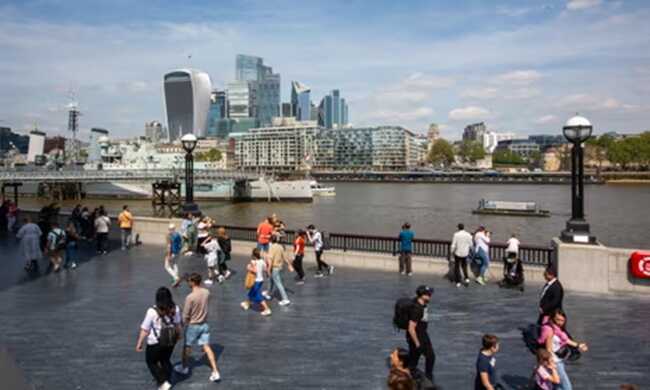
The economy grew by more than initially estimated in the first three months of 2024 as the UK emerged from recession, revised official figures show.
Between January and March, the economy grew by 0.7% the Office for National Statistics (ONS) said.
Figures released last month initially estimated growth had been 0.6%.
The strength of the economy has been a central battleground in the general election campaign, with growth having been sluggish in recent years.
Most economists, politicians and businesses want to see GDP rising steadily, because it usually means people are spending more, extra jobs are created, more tax is paid to the government and workers get better pay rises.
The original figure for the first quarter of the year was stronger than economists had expected, and growth in the services sector, which includes businesses such as hairdressers, banks, and hospitality, helped to push it higher, the ONS said.
But while services growth was revised upwards, increases in manufacturing were revised down on the back of more data being collected.
Paul Dales, chief UK economist at research company Capital Economics, said the faster growth rise in GDP in early 2024 was "mainly due to upward revisions to consumer spending".
The ONS said there was increased spending on recreation and culture, as well as housing and food, but added household disposable incomes had continued to rise in early 2024 as workers secured wage increases.
Mr Dales said this meant household saving rates rose from 10.2% at the end of last year to 11.1%, which was the highest rate since mid 2021 when savings were boosted during the Covid pandemic.
He added the new figure suggested "whoever is Prime Minister this time next week may benefit from the economic recovery being a bit stronger".
While the UK has emerged from the economic recession it entered in the final months of 2023, many households may not be feeling better off, with budgets having been stretched by rising prices in recent times.
Interest rates are currently at their highest for 16 years at 5.25%, meaning people are paying more to borrow money for things such as mortgages and loans, although savers have also received better returns.
The latest figures on the economy show it failed to grow in April after particularly wet weather put off shoppers and slowed down construction.
The Bank of England, which sets interest rates, has opened the door to cutting them in August in what would be the first drop in borrowing costs for more than four years.